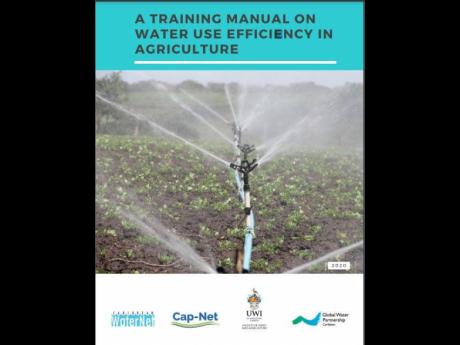Earth Today | High praise for new water tools
LOCAL PUNDITS have welcomed news of two new water-related knowledge products for the Caribbean and at a time of ongoing battle, not only with the raging COVID-19 pandemic but also the beast of a changing climate to which careful consideration and planning for the vital natural resource are integral to any successful response.
Developed by Global Water Partnership Caribbean (GWP-C), the two products are titled the ‘Training Manual on Water Use Efficiency (WUE) in Agriculture’ and the ‘Training Manual on Aquaculture for Caribbean Small Island Developing States (SIDS) – Improving Water-Related Food Production Systems in Caribbean SIDS’.
The Manual on WUE in Agriculture, which aims to build capacity for improved water management and productivity in the sector, builds on a 2011 Training Manual for WUE in the agriculture sector, which was developed by GWP-C with the support of Caribbean WaterNet.
Among its specific learning requirements are demonstrating the benefits of improved WUE and methodologies for assessing the economic benefits of improved WUE, as well as explaining the potential impacts of climate change on water resources use in the sector. Also included in the objectives is initiating discussions at management levels that will make provisions for the adaptation of WUE measures.
MANUAL TOPICS
The modules cover Water Resources, Climate Change and Use Efficiency; Crop Water Use; Irrigation Technologies; Irrigation Scheduling and Monitoring Technologies; Crop Husbandry and Water Use Efficiency; and Agricultural Water Management and Alternative Production Systems.
The goal of the Manual on Aquaculture for Caribbean SIDS is to build capacity for improving water-related food production systems in the region, and with topics covered including Choice of Species; System Selection; Site Selection; Hatchery Design and Management; Grow-Out Management; Stock Harvesting and Processing; Water Budgeting and Production Waste Management; as well as Budgeting and Cash Flow Management.
“The manuals are very timely and very well needed at this time when we are facing extremes of drought and flooding. They can make a big difference to the agriculture sector and also to the aquaculture sector,” noted Eleanor Jones, development professional and head of the regional consulting firm, Environmental Solutions Limited.
‘Water use, for example, is very important. That manual gives us a step by step of the benefits and calculation models; demonstrates methodologies for assessing the economic benefits, and explains the potential impacts of climate change on water resources wile fostering discussions on retrofitting the industry with water use efficiency devices,” she added.
ONLINE ACCESS
Jones cautioned, however, that the manuals, currently available at the GWP-C website at https://www.gwp.org/, must be accessed and utilised to derive the benefits.
Indi Mclymont-Lafayette, knowledge management and communications consultant with the Adaptation Programme and Financing Mechanism of the Pilot Programme for Climate Resilience in Jamaica, agreed.
“These two knowledge products are welcomed and needed for stakeholders in the agricultural sector. I was particularly impressed with the training manual on water efficiency because it makes the critical link to climate change and explores how climate impacts like droughts will affect farmers and Caribbean food security,” she told The Gleaner.
“That is critical information for everyone. I also liked the way the information was presented in that – relatively easy to follow and a page with lessons learnt – so the reader can easily digest the information,” Mclymont-Lafayette added.
“The training manual for aquaculture is more technical but it provides a good alternative to traditional farming methods to those who want to explore options in this age of climate change. I would encourage persons to download and make use of these two resources and to share with others,” she said further.
Chris Corbin, programme officer for the pollution and communications subprogrammes in the Ecosystems Division of United Nations Environment Programme, himself had high praise for the two products and the anticipated benefits.
“The recent training materials developed by one of UNEP’s Partners – Global Water Partnership Caribbean on Water Use Efficiency in Agriculture and Developing Aquaculture in SIDS are not only aimed at the critical issue of food security, but also on adopting more integrated approaches to water resources management while building resilience to climate change,” he noted.
“UNEP is expecting to partner further with GWP-C under a new GEF-funded project on water and wastewater management (CReW+) to develop new training materials for improving water resource management in all sectors from agriculture to tourism. The IDB and UNEP will convene a virtual Inception Workshop and the 1st Project Steering Committee meeting from November 23 to 25,” he added.
According to Corbin, there is more to come.
“UNEP is also currently developing new training material on rainwater harvesting under the joint UN Human Security Programme in Jamaica, which builds upon a rainwater harvesting toolbox also developed by the GWP-C,” he said.



